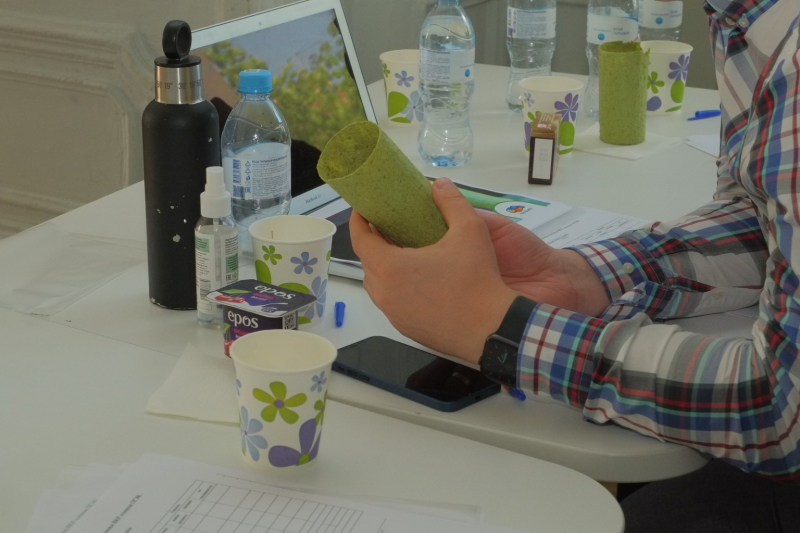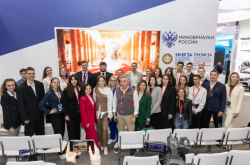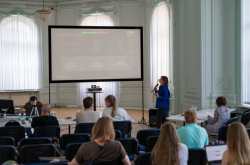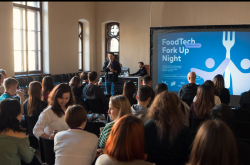FoodTech Entrepreneurship is a joint training program of ITMO’s food technology department and Faculty of Technological Management and Innovations, which combines unique technologies from research with entrepreneurial competencies in marketing, business strategies, and product promotion. Working side by side, scientists can efficiently fill their knowledge gaps that prevent them from breaking into the market, while future business specialists get to work on research-backed cases.
The thesis defense covered the latest trends in food technology, from smart and sustainable packaging, product safety and monitoring, and functional nutrition to computer technologies in global manufacturing. After all, that is what today’s foodtech manufacturers, retailers, and other experts are most interested in – high-tech research-based projects that will make manufacturing more advanced, eco-friendly, functional, and cost-efficient.
That’s why it came as no surprise that the owners and CEOs of Russia’s largest food companies (e.g., the Teremok fast food chain, the Vkusvill supermarket chain, the Galaktika dairy company, etc.) agreed to evaluate students’ graduation projects, alongside the deputy chair of investments, development institutions, and export support committee of the Russian Union of Industrialists and Entrepreneurs, as well as the head of the Association of Catering Establishments Restograd.
Some projects left such a lasting impression on the experts that they have already reached out to their developers to discuss their possible implementation, if the latter manage to scale up their developments and adapt them to mass production.
Olga Orlova
Head of the FoodTech Entrepreneurship specialization, thesis supervisor, associate professor at ITMO’s Faculty of Technological Management and Innovations, and head of the digitalization and robotization of food technologies group at the Infochemistry Scientific Center
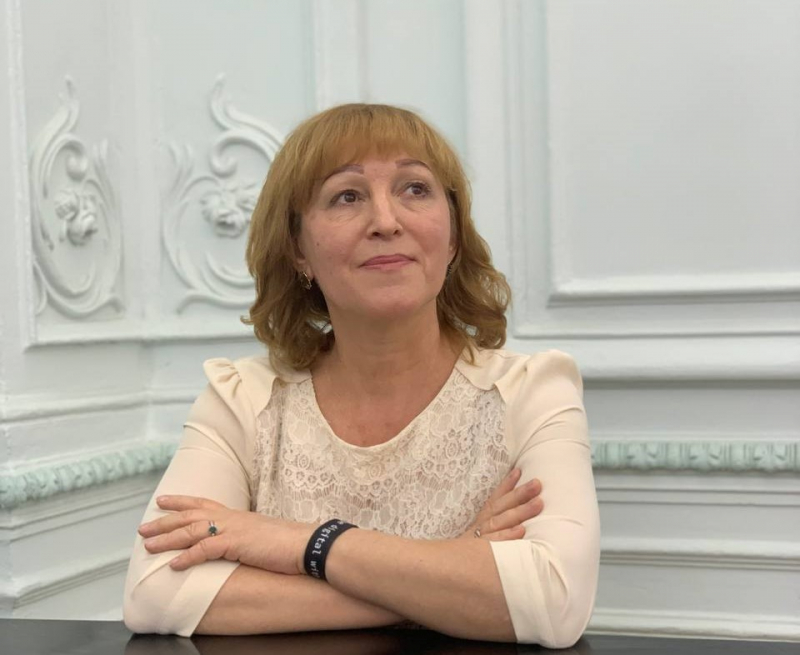
Olga Orlova. Photo by Ekaterina Shevyreva / ITMO.NEWS
One of the innovations that we had this year is ITMO sommelier, which is, in fact, a prototype of a wine authentication system that brings forward the best of two university units.
Here is how it came about: the staff of the Infochemistry Scientific Center created a trending ready-made prototype that FTMI students then turned into a full-fledged and science-backed startup, which has already caught the eye of Fanagoria and other Russian-based wine manufacturers.
This experience showed us that collaborations within the university are quite efficient. With this in mind, we plan to launch teams with students from different university units – the Infochemistry Scientific Center and the FTMI in the first place – and even partner with experts from the National Technology Initiative (NIT) to open a startup platform at ITMO where students could seek investments for their graduation projects.
Roman Sonchik
ITMO sommelier project
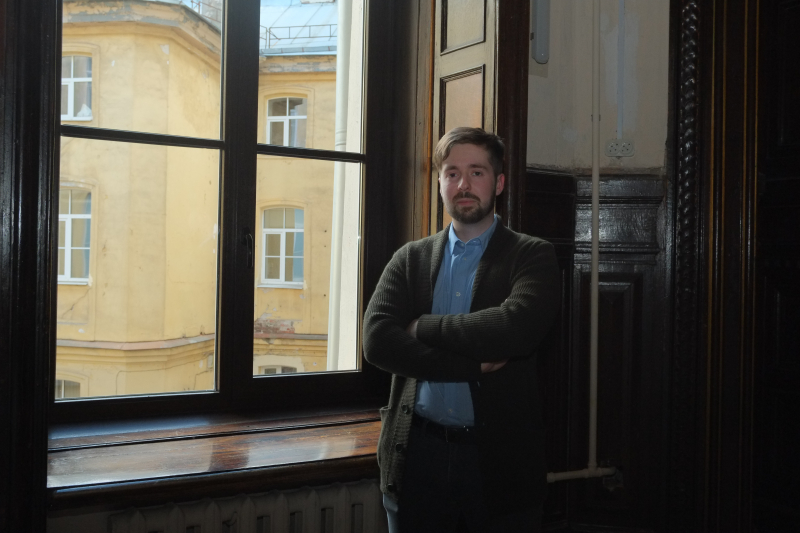
Roman Sonchik. Photo by Ekaterina Shevyreva / ITMO.NEWS
ITMO sommelier is a potentiostat analyzer that was originally meant to detect antibiotics in milk products. The experts from the Infochemistry Scientific Center have been working on this project for three years, with its prototype already handed over to the Galaktika company.
This technology served as a basis for a new project, namely, a wine authentication system. Our task is to discover the electrodes that will interact with wine and then, of course, to test our technology experimentally. In our research, we apply a chemometric analysis technique based on the use of several sensors and devices (potentiostats), as well as mathematical methods for data analysis. The system will allow us to verify the authenticity of wines by determining their region of origin, grape varieties, years of harvest, and batch numbers.
As for potential collaborations, we already have a contract with Fanagoria and are considering a partnership with Tsimlyansky Winery, as well as various Asian companies.
Yana Davydova
ECOTime: Edible Tableware project
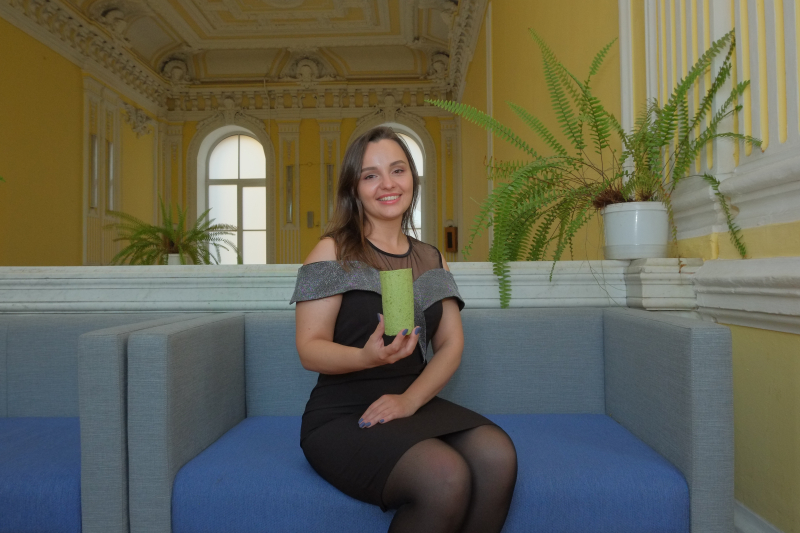
Yana Davydova. Photo by Ekaterina Shevyreva / ITMO.NEWS
We’re presenting edible tableware made from apple-based materials and secondary products of their processing obtained by ultrasonic welding. Basically, we make fruit leather yet with seeds and peel to create eco-friendly and functional dishes that contain nine grams of dietary fiber, which is good for your health.
The idea for this project came along in 2017 when I was a Bachelor’s student. Back then, we won the Umnik contest, received a grant, and built our MVP (minimum viable product). During our Master’s, we focused more on production technologies and scaling. So far, our edible tableware is handmade, which is quite expensive and time-consuming. Yet before going straight into mass production, we have to first conduct additional tests and invest more money into our invention.
We have held talks with the Edelweiss company that produces plastic wrap for food products. The company representatives expressed an interest in our technologies and a willingness to invest, however, we have yet to meet their technology requirements. For instance, they would like to see dishes that can be microwaved, which isn’t yet possible because we use natural materials that decompose when heated.
Another company that is interested in our technology is Teremok, which has a rather simple request – biodegradable tableware for their specialties.
Vitaly Svidovsky
Owner and CEO of the Teremok company in St. Petersburg
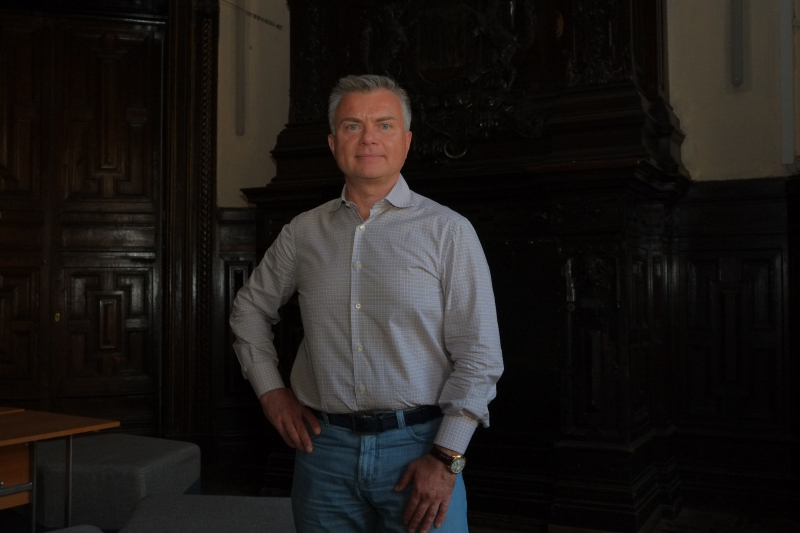
Vitaly Svidovsky. Photo by Ekaterina Shevyreva / ITMO.NEWS
I’m indeed excited about what I got to see during the defense. I believe that our country will have a bright future thanks to such students and institutions.
A year and a half ago, I participated in a thesis defense, too, yet I found the projects a bit raw then, and now I see how much changed over this time. The projects that I got to see this time were much more thoughtful and their presentations – thorough. On top of that, students also didn’t neglect economic and marketing aspects of their research, which deserves a separate mention. Generally, I really enjoyed the presentation.
Teremok is a large, forward-looking company that welcomes new projects and ideas. Here, we do loads of things on our own, and we’re always happy to see students who have something to offer and are ready to collaborate.
I wish the graduates success and more creative initiatives. Don’t be afraid and don’t hesitate, especially when you face negativity and doubt. If your projects are beneficial, they can’t but take off.
Angelina Ivanova and Alina Zakharenko
Creators of the FoodTech beginners course
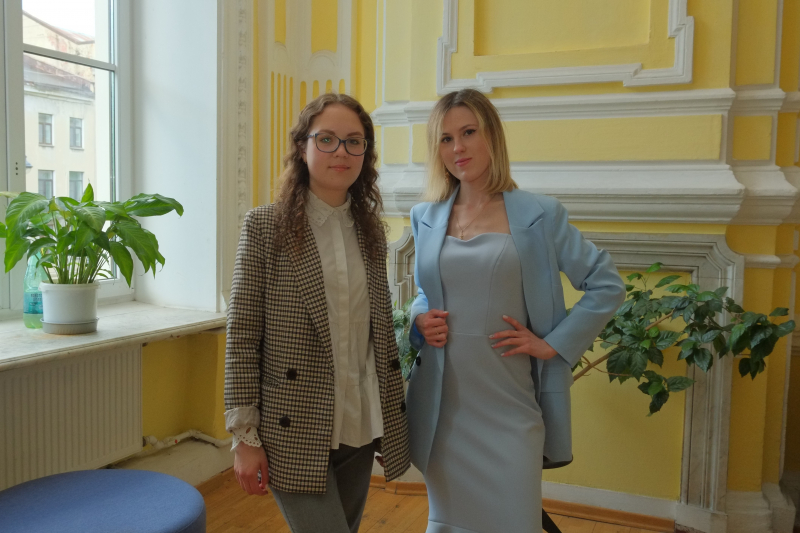
Angelina Ivanova and Alina Zakharenko. Photo by Ekaterina Shevyreva / ITMO.NEWS
Our project is a food technology course for school students, which covers various aspects of the sector, including career prospects, classical and innovative technologies, and so on.
Though food technology is trending right now, there are hardly any specialized courses for school students. We’re thinking of offering our students to study both online and offline. They will be able to use a special VR-based app to study the microbiological composition of products and biochemical processes and at the same time attend practical in-person classes with experts.
We hope that the training will take place at ITMO University. This way, our students will have access to everything they need, including laboratories, technologies, and experts, and the university can expect to see aspiring food specialists enrolling at their programs.
Andrey Zyuzin
Deputy chair of the investments, development institutions, and export support committee of the Russian Union of Industrialists and Entrepreneurs
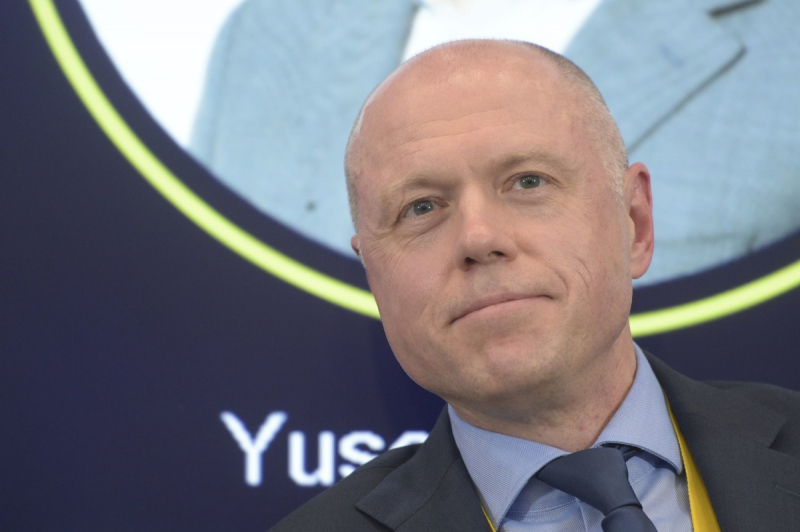
Andrey Zyuzin. Photo by Ekaterina Shevyreva / ITMO.NEWS
It’s simply mind-blowing how students manage to learn to launch startups and create high-quality materials in such a short time. I’m sure that they had excellent mentors and supervisors by their side. I can only wish them to never lose that spark and open-mindedness. Don’t let failures hold you back, keep your passion for change, and be kinder to yourselves and others. Never give up and keep pushing despite any difficulties you may encounter along the way.
Denis Nikolashin
Membrane project
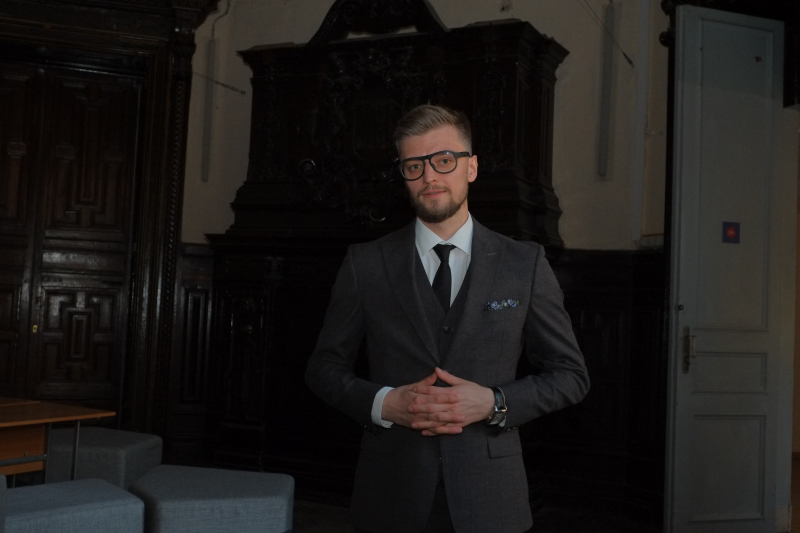
Denis Nikolashin. Photo by Ekaterina Shevyreva / ITMO.NEWS
We came up with a smart packaging technology with EPS (expanded polystyrene) that can increase the shelf life of fish and seafood from 12 to 33 days.
Our team includes around 150 people who were part of cross-functional and interdisciplinary research teams in Russia and Norway (Kozitsky Factory and BEWi, respectively). We’ve been working on the project for eight years to finally deliver a product that meets the demands of the modern market and, what’s more, reduces logistics costs of fishery processing enterprises.
Placed inside the package, fish is conserved via CO2 emission compensation. Though the technology remains a trade secret, I can say that it becomes possible by modifying common industrial gasses, such as О2, СО2, and N2. The styrofoam box itself, which is made of a fully recyclable material used in construction and non-food packaging, possesses an excellent insulating effect.
The technology is designed exclusively for fish processing with no chance of adapting it to other sectors, however, it can be used for further research and experiments.
Ekaterina Popova
Vegan Crunch project
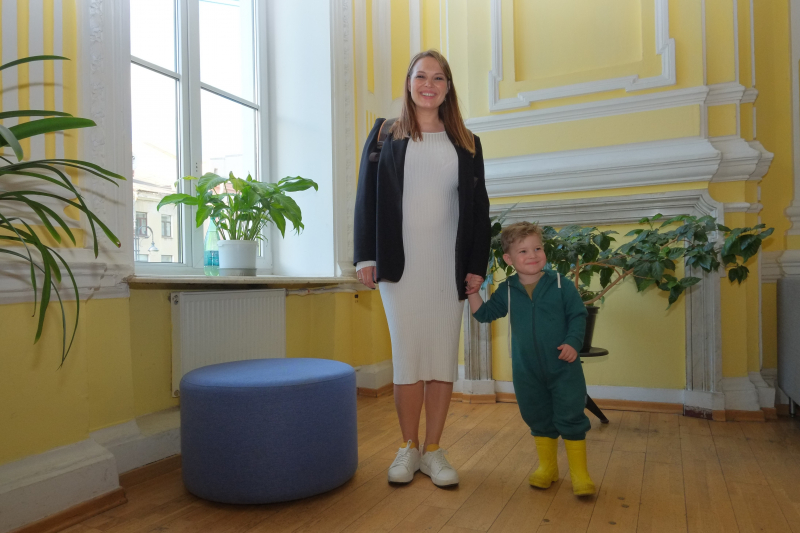
Ekaterina Popova. Photo by Ekaterina Shevyreva / ITMO.NEWS
I presented vegan puff intermediate goods, namely, frozen pastries with no animal fats. These are based on a vegetable spread produced from hydrogenated palm or coconut oils, which are some of the most popular and trusted ingredients.
Lactose-free baking is indeed a promising field of research and a major global trend in foodtech. The main target audience of my project is the B2B sector, including cafes, restaurants, hotels, and retail stores.
The vegan food scene in Russia is currently seeking new products and manufactures, and I even got contacted by one of the companies, which specializes in frozen pastries and intermediate goods.
Oleg Du
CEO of the Galaktika company
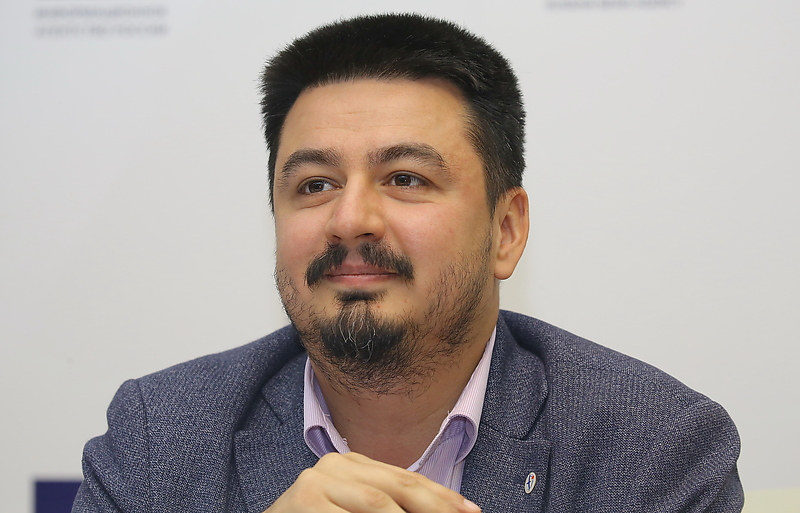
Oleg Du. Photo by Ekaterina Shevyreva / ITMO.NEWS
I was pleased to see projects that seek to use advanced technologies to help people fulfill their basic needs. It’s great that students care equally about the environment and public health, сreate products taking into account the needs of allergy sufferers, athletes, and those who observe a diet, as well as turn to alternative product applications and business processes. With all these measures considered, we can achieve a higher quality of life because food sustains our existence.
The future specialists got off to a flying start in their research, and hopefully they will carry on and we will see these bold ideas turn into a reality one day.
